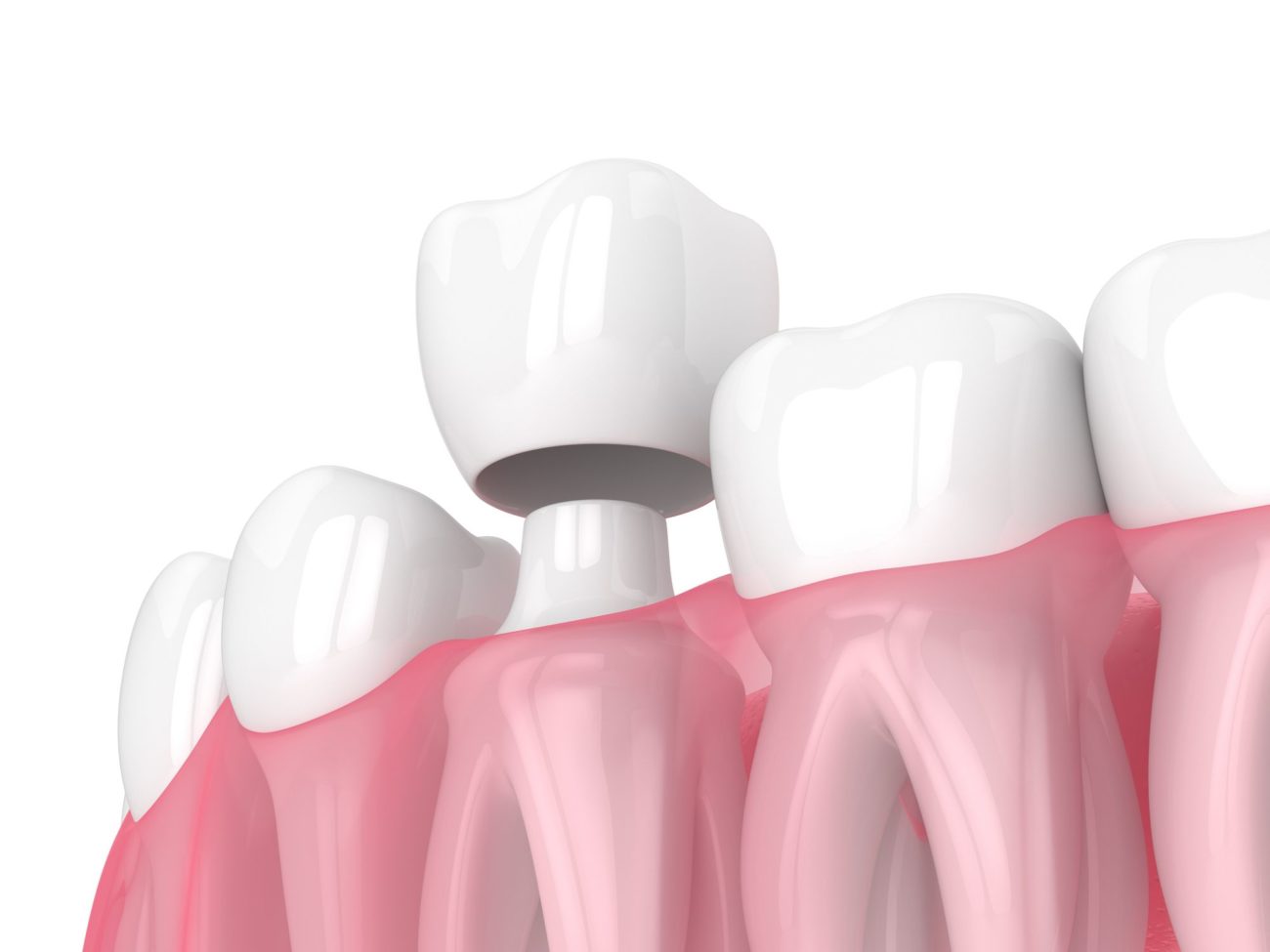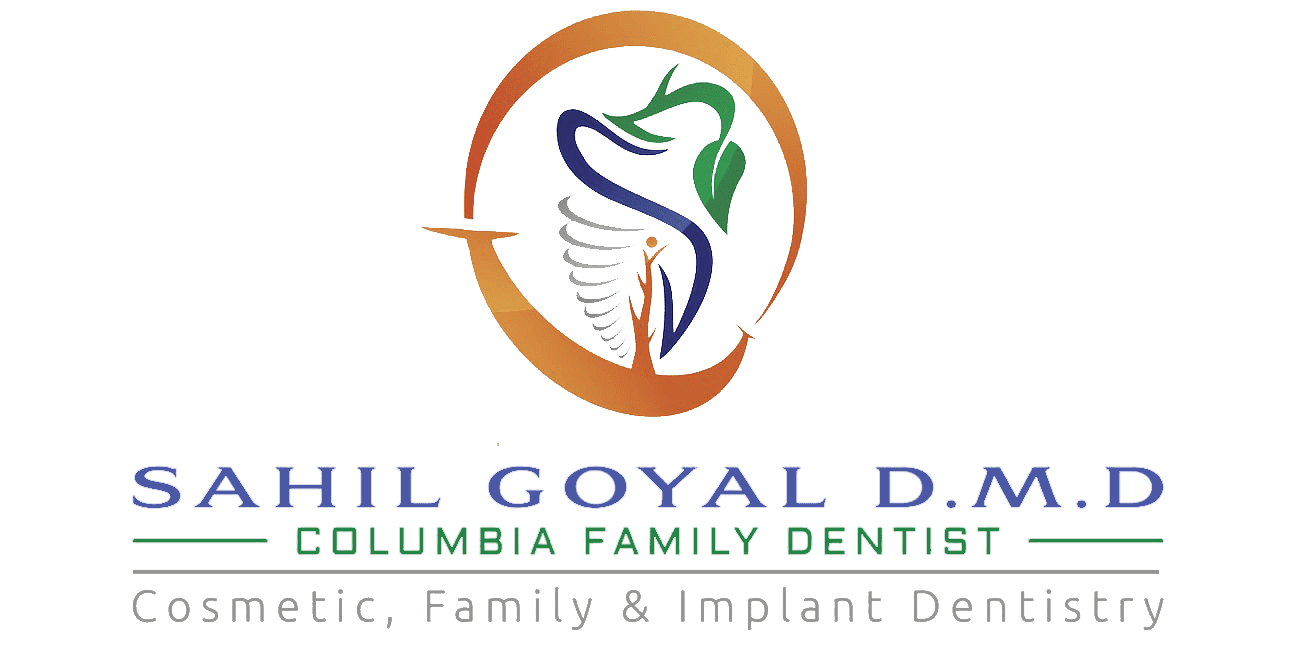Dental Crowns In Columbia, MD
Dental crowns are an essential component of our restorative dentistry services. They can treat various dental issues, including cracked or chipped teeth.
Our Columbia dentist office offers custom-fit dental crowns to meet your restorative dentistry needs. Columbia Family Dentist office provides compassionate and comprehensive dental care for patients in Columbia, Maryland, or surrounding areas like Ellicott City, Laurel, Fulton, and Clarksville. Whether you need to repair a chipped molar or need additional support for a dental bridge, a dental crown can help you keep the functionality of your existing tooth while protecting and covering any damages.

Dental Crowns: How It Works
The dental crown procedure takes about two or three visits to our office. At your first appointment, we will prepare your tooth for a dental crown by removing a large portion of the tooth’s outer layer to make space for the crown. We will administer a local anesthetic to ensure you are comfortable during the procedure. Then, we will place a temporary crown of composite tooth-colored resin on top of your exposed tooth.
This will protect the tooth and help avoid sensitivity or discomfort until your permanent crown is ready. You can speak and chew normally, though you should avoid especially chewy foods while wearing the temporary crown. Once our labs create your permanent crown, we will call you back to our office for placement. Using dental cement, your new crown will be secured into your smile for a restored and improved look.
Dental Crowns: What They Treat
Dental crowns are unique because they can treat many restorative and cosmetic concerns. They’re one of the most versatile tools a dentist can deploy.
Correcting Cosmetic Flaws
Tooth discoloration is the most common cosmetic issue patients experience. Everyone gets discolored teeth at some point. Usually, we use professional teeth whitening to treat it, but not all discoloration responds to traditional methods. With a dental crown, we can color-match it to the shade of white that you desire. It covers your tooth completely, so no part of the discolored tooth will show.
When you have a misshapen or deformed tooth, you’re usually concerned about how it looks. However, it can also have impacts on your oral health. Teeth are essential for speaking and eating properly. Your tongue interacts with the teeth to form sounds and words; each tooth is important for certain eating tasks. A dental crown restores proper appearance and function so that you don’t have any issues in the future.
Strengthening Natural Teeth
One of the most common things a dental crown does is stabilize a tooth after a root canal. During a root canal procedure, we remove infected dental pulp from the center of your tooth and replace it with a biocompatible material. Sometimes, this isn’t enough to restore full function to the tooth. A dental crown restores full function to your tooth and protects it from further infection.
A dental bridge replaces a span of consecutive missing teeth but needs something to support it. This falls on the teeth at either end of the bridge, making them anchor teeth. It puts a lot of stress on these teeth, making them more likely to wear down faster or suffer from tooth decay. A dental crown protects your natural tooth structure by taking on the stress of supporting the bridge.
Treating Broken and Decayed Teeth
A small chip or cavity isn’t a huge deal for oral health. But a bigger break or extreme decay are different. Dental crowns are usually the last line of defense for treating these issues. They can hold together shattered pieces of a tooth or replace structures lost to decay. We try to preserve the natural tooth structure whenever possible to avoid the negative effects of losing the tooth root.
When you break a large piece off of your tooth, it exposes the dental nerves and pulp in the tooth’s center. Brushing against those nerves is painful, making it difficult to eat. The soft innards of your tooth are also ripe for infection. If there are sharp edges from the break, your tongue and cheeks may be in danger, too. A dental crown protects the dental pulp and ensures your tooth can no longer scratch or cut your soft tissue.
Dental Crowns FAQs
Dental crowns can fix almost any dental problem. Read the answers to these commonly asked questions to learn more.
Is the dental crown procedure painful?
Your tooth and the surrounding area receiving the crown will be numbed to avoid pain. You may feel discomfort or pressure throughout the tooth preparation, though we do our best to ensure you remain comfortable. We recommend additional sedation dentistry solutions to patients who are especially nervous about this procedure.
How long does a dental crown last?
With good dental hygiene, a dental crown can last you up to ten years and sometimes longer. Scheduling regular preventative maintenance is also important to monitor the condition of the crown and its surrounding teeth for necessary repairs. The better you care for your restoration, the longer it’ll last.
What happens if my temporary crown comes off?
If your temporary crown falls off before we can provide you with your permanent dental crown, please call our office immediately at 410-670-8211. Try gently placing the temporary crown back over your exposed tooth to help avoid discomfort. The exposed dentin can cause sensitivity and greatly impact the function of your bite, so we must see you as soon as possible to reattach the temporary crown.
Schedule A Dental Exam at Columbia Family Dentist
If you are looking for a restorative dentist in Columbia, Maryland, Dr. Sahil and Anshu Goyal are here to help you. We provide a range of services, including dental crowns, to our patients. We understand that you may have questions regarding the dental crown process, and our team looks forward to discussing this procedure with you more in-depth at your initial consultation. Schedule an appointment with our team today or call us at 410-670-8211.
